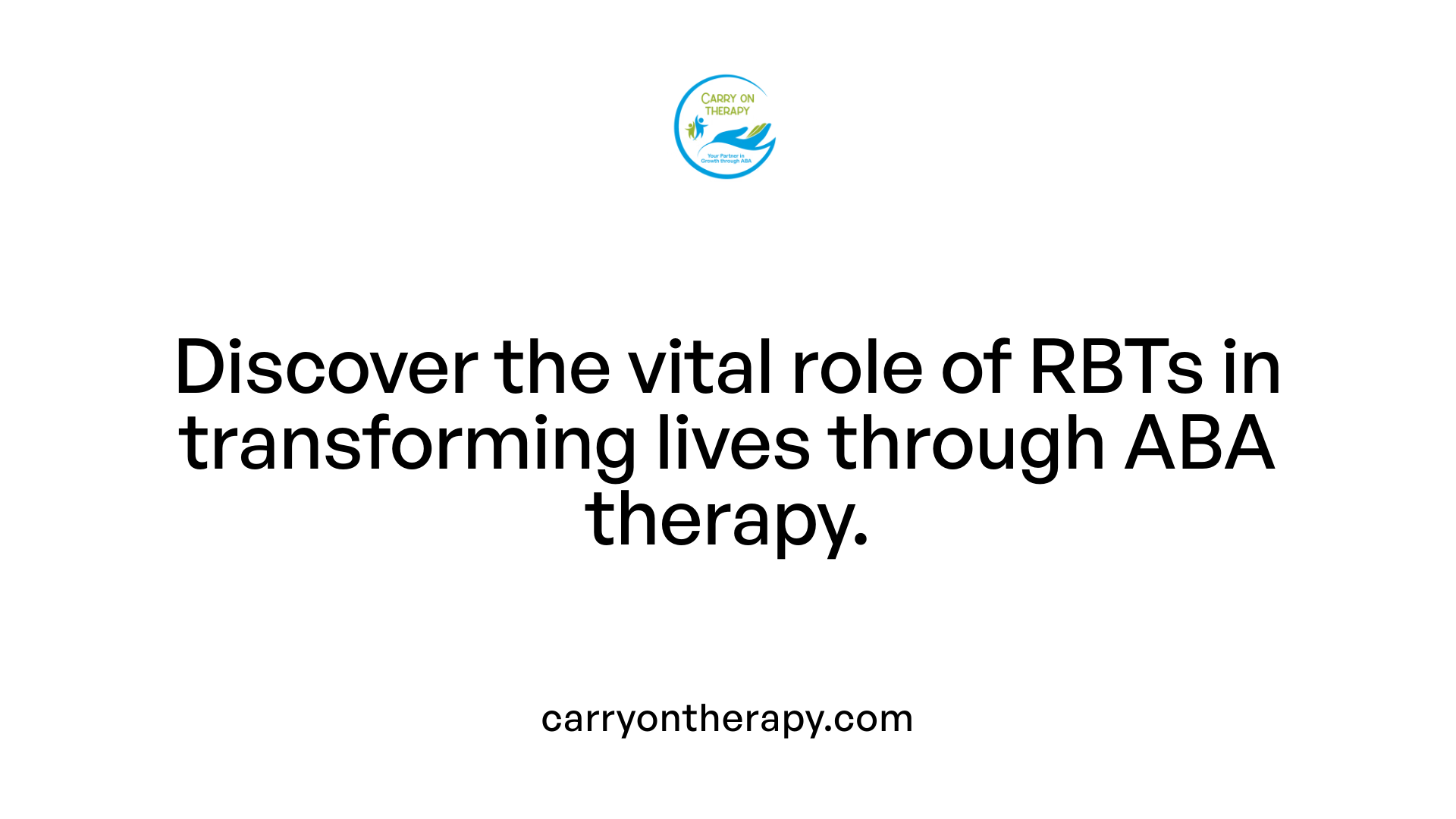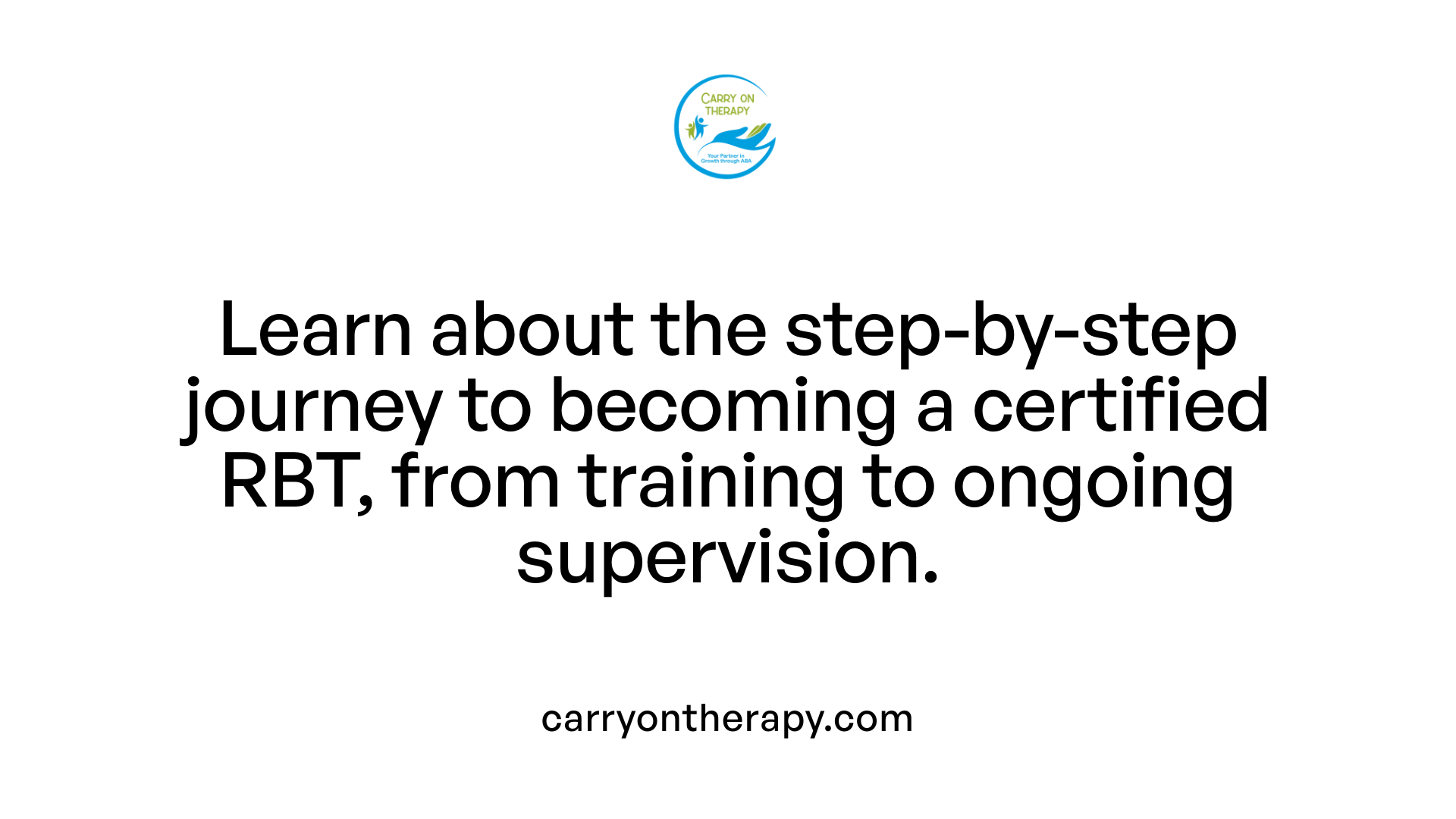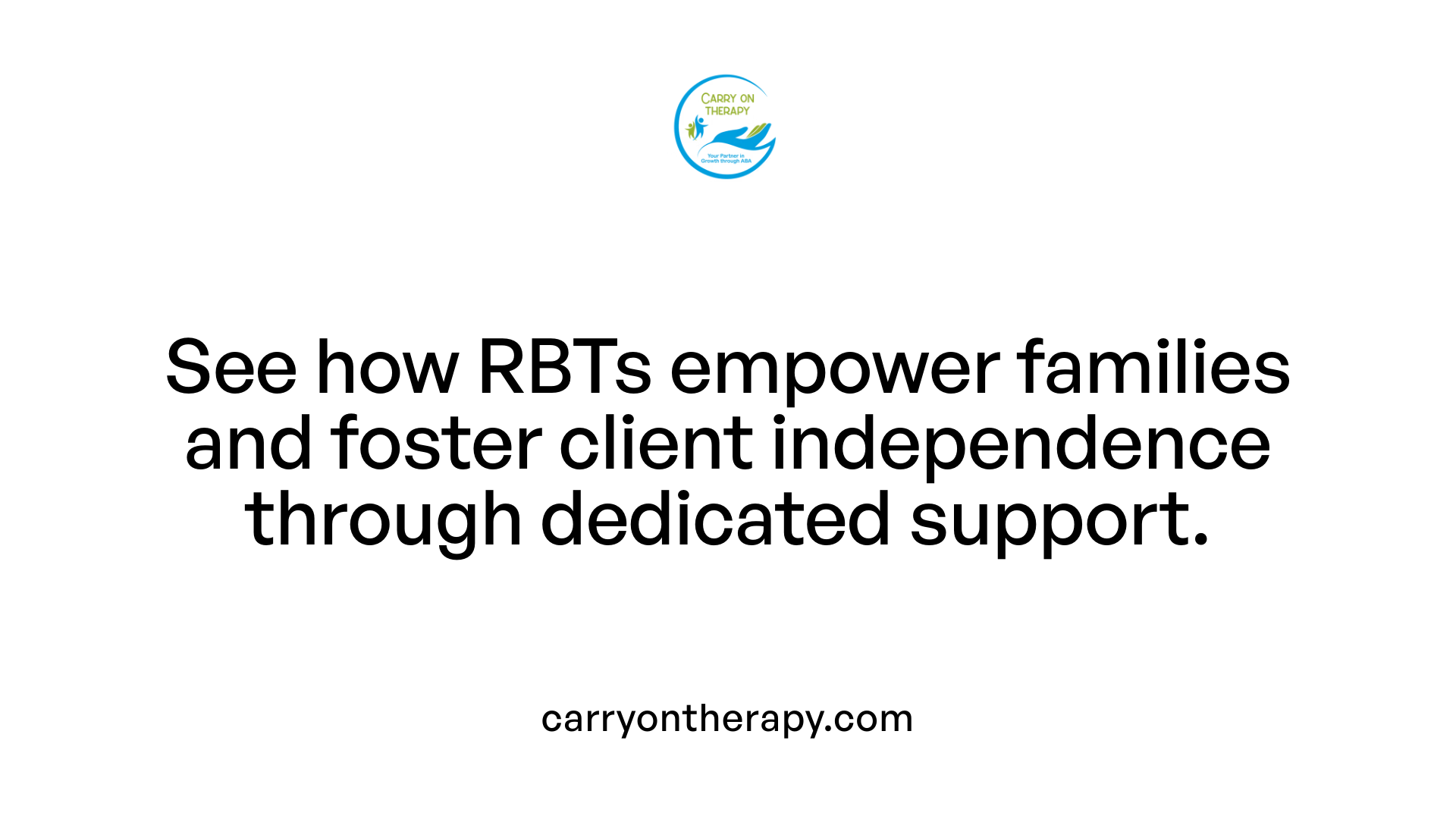Introducing the Registered Behavior Technician in Autism Therapy
Registered Behavior Technicians (RBTs) are vital contributors in the field of applied behavior analysis (ABA) therapy, particularly for individuals with autism spectrum disorder (ASD). This article explores the certification, duties, and impact of RBTs, illuminating their crucial role under the supervision of Board Certified Behavior Analysts (BCBAs) in delivering behavior-analytic services and improving client outcomes.
What Is a Registered Behavior Technician?

Definition of RBT
A Registered Behavior Technician (RBT) is a certified paraprofessional working directly with individuals who have autism or other developmental disabilities. RBTs provide hands-on Applied Behavior Analysis (ABA) therapy by implementing behavior intervention plans designed by Board Certified Behavior Analysts (BCBAs). Their role focuses on improving skills such as communication, social interaction, and behavior management through structured, consistent interventions.
Certification Process
To become an RBT, individuals must meet several requirements: be at least 18 years old, hold a high school diploma, pass a background check, complete 40 hours of specific behavior therapy training, and successfully pass a competency assessment overseen by a BCBA. Next, candidates take a 90-minute certification exam covering topics like assessment methods, behavior reduction strategies, skill acquisition, documentation, and ethical standards. Maintaining certification requires ongoing supervision, adherence to a code of ethics, annual renewal, and continued competency evaluations.
Supervisory Structure
RBTs always work under the supervision of qualified BCBA supervisors or RBT requirements coordinators. While RBTs are responsible for delivering day-to-day therapy, BCBAs oversee all aspects of treatment planning, assessment, and supervision. This structure ensures that therapy is tailored to individual needs and that all interventions meet professional and ethical standards.
ABA therapy services are typically provided by a team that includes BCBAs, RBTs, and licensed therapists. BCBAs design and supervise treatment, while RBTs implement these strategies directly with clients in clinical, educational, or community settings. This team approach allows for comprehensive support tailored to each client’s unique developmental needs.
The Certification and Training Path for RBTs

Eligibility requirements
To become a Registered Behavior Technician (RBT), candidates must be at least 18 years old and hold a high school diploma. They must also pass a background check to ensure suitability for working with vulnerable populations.
40-hour training
Applicants complete a mandatory 40-hour training program covering essential ABA techniques, ethics, and procedures. This training follows the BACB’s RBT Task List, which includes over 30 job functions across six categories to ensure comprehensive preparation.
Competency assessment and exam
After training, candidates undergo a competency assessment administered by a Board Certified Behavior Analyst (BCBA). This hands-on evaluation verifies practical skills in behavior analysis. Upon successful completion, candidates take the RBT certification exam, a 90-minute multiple-choice test covering measurement, skill acquisition, behavior reduction, reporting, and professional conduct.
Ongoing supervision and renewal
RBTs maintain certification by receiving continuous supervision from qualified professionals, adhering to the BACB’s code of ethics, and completing annual renewal requirements. This includes self-reporting and a competency reassessment to ensure skills remain current and effective in practice.
What qualifications should parents look for in ABA therapy providers?
Parents seeking ABA therapy for their children should prioritize providers certified as BCBAs or RBTs with experience in autism support. Providers must have proper licensing — including administrative offices in California if applicable — offer personalized, regularly updated treatment plans, and actively involve families in therapy. Confirming insurance acceptance, including Medi-Cal, and verifying provider certification and supervision practices ensure quality and effective services.
Understanding Applied Behavior Analysis (ABA) Therapy and the RBT's Role
What is Applied Behavior Analysis (ABA) therapy?
Applied Behavior Analysis (ABA) therapy is a scientifically grounded treatment method focused on understanding and changing behavior. It is mainly used to support individuals with autism spectrum disorder (ASD) by reinforcing positive behaviors and decreasing harmful or disruptive ones. ABA programs are designed individually by professionals like Board Certified Behavior Analysts (BCBAs) and can be applied in environments such as homes, schools, or community settings. Common techniques include discrete trial training, naturalistic teaching procedures, and the consistent use of positive reinforcement. Continuous data collection is an essential part of ABA to evaluate progress and customize interventions.
How does ABA therapy help individuals with autism?
ABA therapy assists people with autism by systematically promoting useful behaviors and reducing those that might impede learning or social interaction. Skills are broken down into smaller parts, making learning more manageable. The approach covers areas like social communication, daily living skills, emotional regulation, and academic development. By tailoring therapy to each individual's needs and environment, ABA enhances independence, prepares individuals for everyday tasks, and improves their overall quality of life.
How do RBTs apply ABA techniques?
Registered Behavior Technicians (RBTs) are frontline professionals trained to implement ABA strategies under the supervision of BCBAs. They deliver one-on-one interventions, working directly with clients, especially children with autism. Their interventions include structured activities like behavior modification, skill acquisition tasks, and social skills development. RBTs collect and analyze data to help refine therapy and ensure effectiveness. Moreover, they support families by coaching them on behavior strategies, ensuring continuity outside therapy sessions. Through their consistent work, RBTs help clients progress toward developmental milestones, fostering independence and positive social interactions.
Typical Duties and Daily Activities of an RBT
What does an ABA therapy session typically involve?
An ABA therapy session is structured and individualized, focusing on skill-building with techniques such as discrete trial training and naturalistic teaching. Registered Behavior Technicians (RBTs) engage in hands-on intervention, working directly with clients to target communication, social interaction, and behavioral skills.
Hands-on intervention techniques
RBTs implement behavioral strategies throughout the day, including teaching essential life skills, using positive reinforcement methods like praise and rewards, and fostering independence. Each session is tailored to meet the developmental milestones of the client.
Behavior modification and social skills development
Behavior modification is a core activity for RBTs, who apply behavior intervention plans developed by supervising Board Certified Behavior Analysts (BCBAs). They work on enhancing social skills and managing challenging behaviors through consistent, structured interventions.
Data collection and family collaboration
Accurate data collection is a daily responsibility for RBTs; it informs therapy adjustments and tracks progress. They also collaborate closely with families, providing coaching and strategies to ensure consistency across home and community settings, which helps generalize learned skills.
Through these routine activities, RBTs play a vital role in supporting clients with autism and other developmental challenges, promoting meaningful improvements in daily living and communication.
Collaboration and Impact: How RBTs Support Families and Clients

Working with Families and Caregivers
Registered Behavior Technicians (RBTs) work closely with families and caregivers to ensure therapy is consistent across all environments. They provide coaching and support on behavior management strategies, empowering families to reinforce skills developed during sessions. This collaboration strengthens the overall therapeutic plan and helps maintain progress outside of clinical settings.
Tailoring Therapy to Client Needs and Settings
RBTs deliver individualized Applied Behavior Analysis (ABA) interventions adapted to each client's unique needs. They work in diverse environments such as schools, homes, and community settings, modifying approaches to fit each context. This flexibility allows RBTs to address specific developmental goals and behavioral challenges effectively.
Promoting Skill Generalization and Independence
Through structured and consistent interventions, RBTs focus on helping clients generalize skills across various settings and situations. Their hands-on work supports social growth, communication, and daily living skills, fostering greater independence. By applying behavior intervention plans, they contribute significantly to clients' long-term success and quality of life.
Career Outlook and Ethical Considerations for RBTs

Employment Growth and Demand
The career outlook for Registered Behavior Technicians (RBTs) is very promising due to the increasing recognition and demand for behavioral interventions, especially in autism therapy. As awareness of autism spectrum disorder (ASD) grows, more families and institutions seek qualified professionals to provide Applied Behavior Analysis (ABA) services. This increased demand fuels job opportunities in diverse settings such as schools, clinics, community centers, and homes, often with room for professional development and specialization.
Ethical Standards and Ongoing Professional Development
RBTs adhere to a strict code of ethics outlined by the Behavior Analyst Certification Board (BACB). Maintaining certification requires ongoing supervision, continued training, and annual competency assessments to ensure ethical and effective practice. These standards emphasize respect, client dignity, data-driven interventions, and collaboration with families to foster positive outcomes. Continuous professional growth is essential for RBTs to stay current with best practices and advance their skills.
Are there any controversies or criticisms surrounding ABA therapy?
ABA therapy has faced controversy primarily due to its early use of aversive techniques like electric shocks, which are now condemned. Critics highlight that some traditional ABA methods were rigid and could cause emotional distress, suppress autistic behaviors such as stimming, and prioritize neurotypical appearances over individual well-being. Some self-advocates express concerns about masking and diminished autonomy. Despite these criticisms, modern ABA approaches focus on person-centered, positive, and naturalistic techniques promoting independence and respecting individual differences. The emphasis is now on ethical, compassionate care that supports the unique needs of each client.
The Essential Role of RBTs in Autism Therapy
Registered Behavior Technicians stand at the frontline of implementing life-changing interventions for individuals with autism. Their rigorous training, close collaboration with families, and hands-on execution of tailored ABA therapy programs under qualified supervision position them as indispensable allies in behavioral health care. As awareness and demand for ABA therapy continue to grow, RBTs will play an increasingly central role in supporting developmental progress and enhancing quality of life for those they serve.
References
- Registered Behavior Technician (RBT)
- The Role of a Registered Behavior Technician
- ABA Certification Explained: RBT, BCaBA, BCBA, BCBA-D
- What Is An RBT?
- RBT vs. BCBA Career Paths - School of Education
- What is a Registered Behavior Technician?
- The Controversy Around ABA
- Is ABA therapy harmful? The controversy explained
- Debunking 7 Common Myths About ABA Therapy - GSEP Blog
You have to Start to be Great!




